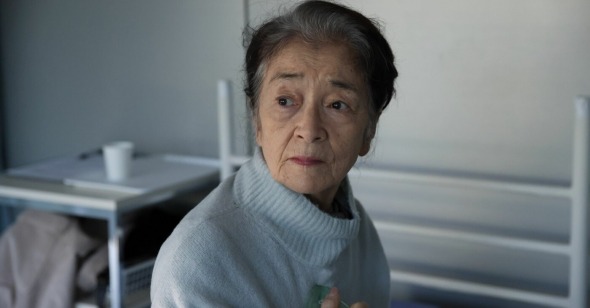A Simple Solution
By Daniel Schindel
Plan 75
Dir. Chie Hayakawa, Japan, KimStim
Japan is the most geriatric nation in the world, with nearly a third of its population estimated to be over the age of 65. Experts forecast that demographics will only continue to trend older as birth rates stay low, which will strain the country’s social welfare systems and debt. With an increasing number of elderly people struggling to get by and estranged from their families, debate rages over how to handle the issue. Economist, Yale professor, and part-time edgelord pundit Yūsuke Narita caused a stir on social media in 2021 when he “jokingly” proffered mass suicide as a solution to the problem. In her debut feature Plan 75, Chie Hayakawa takes this idea to its logical conclusion, excoriating institutional neglect and societal apathy in the process.
In a not-too-distant future Japan, Plan 75 is a government program which offers people over the age of 75 a token monetary incentive to accept euthanasia, suggesting it’s their civic duty to cease “burdening” the country. Michi (Chieko Baisho) is 78 and uninterested in participating, until she loses her job as a hotel cleaner and faces eviction from her apartment. Hiromu (Hayato Isomura) is a bureaucrat who takes on her case. A true believer in the program, Hiromu displays a courteousness toward his “clients” that belies the monstrosity he’s a part of, but he starts to have second thoughts when his estranged uncle Yukio (Taka Takao) asks to be euthanized. Separate from these two stories is that of Maria (Stefanie Arianne), a migrant caretaker from the Philippines who starts doing the more unsettling legwork for Plan 75 (disposing of bodies and sorting through their possessions) after her daughter’s health takes a turn for the worse.
While the premise evokes the likes of Logan’s Run, Hayakawa takes a firmly grounded approach to the story, more in line with the somber low-key humanism of Ken Loach or Naomi Kawase. The more overtly speculative aspects make for some of the film’s clumsier moments, with many of the details of Plan 75 delivered via expository means like public service announcements. But those elements don’t figure too largely and are mostly frontloaded, with the commentary growing more subtle as it goes on.
The social critique stings because of how much of it could easily appear in a non-sci-fi context. The conditions pushing Michi toward accepting her own death are disquietingly mundane; no extravagant technological horror or imagined future disaster figures into the plot. Rather, she is simply lonely, in the way that so many elders are. She starts the film in a solitary but comfortable place, being able to maintain her modest but warmly decorated apartment with a low-pressure job she finds fulfilling, sharing time with a few close friends. The hotel lets her go because one of her fellow senior cleaners suffers an injury and they don’t want to incur any further risk of employing elders. She can’t find new work, and her attempts to go on welfare are met with cold indifference—“come back tomorrow” placards and non-working digital kiosks. In contrast, the government is only too happy to help her die, with encouraging advertising and knowledgeable Plan 75 representatives.
The film runs into difficulty, though, when dramatizing its ideas through the characters. The thread concerning Hiromu and Yukio makes the same mistake as too many other dystopian narratives, giving characters a moral revelation about what is likely obvious to the audience. Rather than deepening any of the themes, it’s redundant. Maria is also underserved; while her subplot effectively demonstrates how economic hardship coerces people to act against their morals, she’s also off-screen for such long stretches of time that it’s easy to forget about her. And while it is part of the point that Michi lacks agency, the movie strains to fill her out as a human, only giving Baisho one mode to play: dignified and quietly heartbreaking.
In a dramatic tone-setting, the film opens at a blood-soaked nursing home in the aftermath of a mass shooting, inspired by an actual stabbing attack at a disabled care home in Kanagawa in 2016, in which 19 people were murdered and 26 more injured. Nothing in the rest of Plan 75 is so graphically violent, but that threat hangs over the rest of the story. In both the real and fictional mass murders, the perpetrators proclaim their faith in “euthanasia” as a social good. Despite the sympathetic face it puts on Plan 75, the Japanese government’s motives are just as callous.
Plan 75 is similarly on its surface a polite, quiet film, which facilitates its most potent commentary. Aesthetically it is in line with many contemporary Japanese dramas—soft lighting, cool color tones, static shots, a score dominated by a gently tinkling piano, understated acting. More than lending verisimilitude to its outré premise, Hayakawa is turning the very form of the respectable middlebrow entertainment film against itself. The suggestion is that these widely accepted cinematic signifiers of tastefulness and mature storytelling can also cover for an underlying collective ugliness. It's a shame this acute aesthetic judgement isn’t formed around a stronger narrative framework. The characters are mostly reactive, with the screenplay adopting a repetitive pattern of confronting them with some new bit of inhumanity and having them respond with almost identical stoic consternation each time, which is symptomatic of its broader difficulty with building a plot around its ideas. The points Plan 75 makes are sharp, but lacking that support, they don’t pierce as much as they could.
